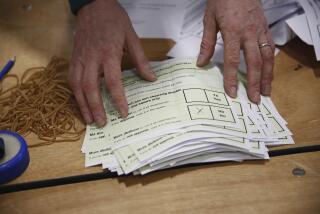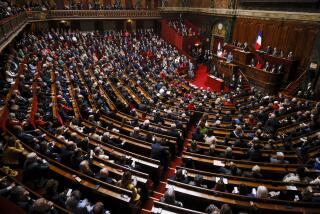Syria votes on new constitution; opposition, U.S. reject the poll
With violence flaring in several regions, Syrians cast ballots Sunday for a new constitution hailed as a historic breakthrough by President Bashar Assad and denounced as a farce by his opponents.
The vote came almost a year after widespread antigovernment protests broke out, inspired by so-called Arab Spring revolts elsewhere in the region.
Syrian authorities responded with a fierce crackdown, but the protests persisted and evolved into an armed insurgency that has wrested some areas from government control. Assad has rejected opposition demands that he resign and calls the new constitution proof of his commitment to democratic change.
Assad’s opponents label the vote a stalling tactic, and a White House spokesman has dismissed the balloting as “laughable.”
On Sunday, Secretary of State Hillary Rodham Clinton told the BCC that there was “every possibility of a civil war” in Syria and warned that foreign intervention probably would speed it up.
Interior Minister Maj. Gen. Mohammad Ibrahim Shaar told the official Syrian Arab News Agency that voter turnout was brisk “except in some areas.” Syrian television showed pictures of Assad, his wife and other people calmly casting ballots.
“The Syrian people support the constitution and the president,” one voter told Addounia television, which is privately owned but staunchly pro-government.
State media reported that huge crowds rallied in support of the new constitution in Damascus’ Saba Bahrat Square, hoisting the Syrian flag and likenesses of Assad, whose family has ruled for more than 40 years. Assad still maintains considerable support, especially among minority groups and middle- and upper-class Syrians who fear that Iraq-style chaos will ensue should he fall.
Many independent observers agree that the new constitution contains some important reforms, such as enshrining a right to free speech, ending the ruling Baath Party’s monopoly on power and setting the stage for multiparty elections. But the blueprint would leave Assad in power with the possibility of running for a pair of new seven-year terms.
Opposition activists say the reforms may have been acceptable a year ago, but that only Assad’s ouster will satisfy them now.
“A lot of blood has been spilled. There are people who have been killed, and killers who need to be punished,” said an activist reached Sunday in the western city of Homs, a hub of the rebellion.
Such comments illustrate how the opposition has hardened as the death toll has mounted. Talk from the Assad camp of “dialogue” and “reform” is often met with disdain from opposition leaders, many now committed to armed rebellion to topple the president.
“The referendum is one big joke,” said the activist in Homs, who spoke on condition of anonymity for security reasons. “Each day in Homs we have at least 50 people killed. And they are holding a referendum?”
The activist said there were no polling places operating in antigovernment strongholds like Homs’ Baba Amr, Khalidiya and Qusour neighborhoods. The government said almost 600 polling centers were opened in Homs province, Syria’s third-most populous, among more than 14,000 polling centers nationwide.
The International Committee of the Red Cross said it would try again Monday to evacuate two injured Western journalists, Edith Bouvier of the French daily Le Figaro and Paul Conroy of the Sunday Times of London. Both were wounded last week in a shelling attack that killed two Western journalists, U.S.-born Marie Colvin, a reporter with the Sunday Times of London, and Remi Ochlik, a French freelance photographer.
Mistrust between the government and armed rebels in the Baba Amr district has complicated negotiations to evacuate the injured journalists and retrieve the bodies of their two colleagues. Aid workers must negotiate a truce before going into the heavily contested areas.
State media reported that more than three dozen men from “armed terrorist groups” surrendered to authorities Sunday in Baba Amr.
At least 40 people were reported killed Sunday across Syria, including 17 in Homs, where antigovernment activists reported renewed military shelling, according to the Local Coordination Committees, an opposition coalition. The group also reported eight dead in Hama province in western Syria and seven dead in the southern province of Dara, where the uprising began early last year. The numbers could not be independently verified because of a lack of media access to Syria.
Marrouch is a special correspondent.
More to Read
Start your day right
Sign up for Essential California for news, features and recommendations from the L.A. Times and beyond in your inbox six days a week.
You may occasionally receive promotional content from the Los Angeles Times.






